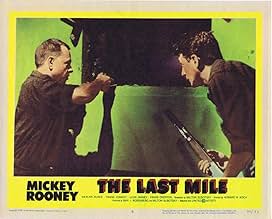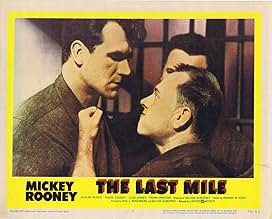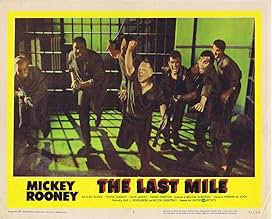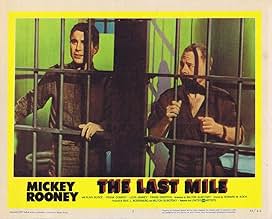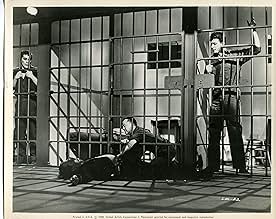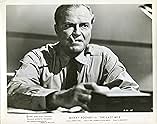Agrega una trama en tu idiomaA prison break is attempted the same night an execution occurs on death row.A prison break is attempted the same night an execution occurs on death row.A prison break is attempted the same night an execution occurs on death row.
- Dirección
- Guionistas
- Elenco
Johnny Seven
- Tom D'Amoro
- (as John Seven)
Don 'Red' Barry
- Drake
- (as Donald Barry)
- Dirección
- Guionistas
- Todo el elenco y el equipo
- Producción, taquilla y más en IMDbPro
Opiniones destacadas
I have seen this movie many times. At least a Dozen. But unfortunatly not recently. However, Etched in my memory never to leave me is a scene in which Mickey Rooney, -"Killer Mears" knows that he is to be executed and it's getting close to the moment of truth, He dances, and cries, and laughs, he vacillates from hesteria to euphoria and runs the gambit of ever emotion. Never have I seen such a brilliant performance by any actor living or dead, past or present. It was then I know for sure that Mickey Rooney, yes, "Andy Hardy" was and is a actor of great genius. However I kept it, my opinion to myself for years thinking, surely I must be alone in this viewpoint. About 15 years or so after I saw this film for the last time on television, I chanced to read the old Q & A section of the Los Angeles Times. The question was posed to Lawrence Olivier, and the question was: "Mr. Olivier You are considered one of the greatest actors of all time, whom then do YOU consider to be among the greatest actors?" His answer was, "Peter Finch and Mickey Rooney" I was stunned, but not surprised. I immediatly flashed back to his "Killer Mears" And I felt very good for having seen this great ability in him, and now having my view supported by another whos work I admired.. Later of course there was "Bill" and many other great moments with Mikey Rooney. This film, "The Last Mile" should be seen by all acting students. I Frankly cannot remember a great deal about the film after all these years but Mr. Rooney in it, will never leave me. If anyone out there remembers this film the same as I do? I would be interested in hearing from you. For this picture etched in my heart alone I gave it a 10 just on the face of his performance.
This remake of The Last Mile has been updated nicely with a nice jazz score and the inmates and prison officials definitely fit the Fifties as opposed to the Twenties when it first appeared on Broadway. But the impact of this searing prison drama hasn't changed and Mickey Rooney stretches his considerable talent to the limit playing the lead of Killer Mears who leads the uprising of the death row inmates.
Mickey has some fast company among the people who've done this part. Spencer Tracy did it on Broadway and his performance there led to his original film contract with Fox. Clark Gable after doing some bit parts and extra work in silent films was spotted doing this in a touring company in Los Angeles which led to his MGM contract. And Preston Foster did it in the original screen version. Rooney's performance stands up to any of their's.
It's a simple plot, but the characters run deep. Before the big attempted breakout we get a character study of each of the inmates on Death Row. It takes a good actor to get himself noticed here though because the character of Killer Mears so dominates the film and the other inmates. These are men with nothing at all to lose, a lot like the inmates shown in The Green Mile. But of course they don't have a character like Mears to whip them in a frenzy when a guard slips and Mears gets the upper hand.
Being that the film is only on one set for 95% of the time, it's a small budget affair, hardly like Ben-Hur which came out the same year. Still Rooney's incredible performance should have merited Oscar consideration. He was nominated for films and performances not half as good as this.
Try to see both the Preston Foster and Mickey Rooney versions together. Too bad we can't see Spencer Tracy or Clark Gable in how they did the role. The Last Mile is timeless as long as we have capital punishment. I can see Russell Crowe doing Killer Mears easily in a 21st Century version.
Mickey has some fast company among the people who've done this part. Spencer Tracy did it on Broadway and his performance there led to his original film contract with Fox. Clark Gable after doing some bit parts and extra work in silent films was spotted doing this in a touring company in Los Angeles which led to his MGM contract. And Preston Foster did it in the original screen version. Rooney's performance stands up to any of their's.
It's a simple plot, but the characters run deep. Before the big attempted breakout we get a character study of each of the inmates on Death Row. It takes a good actor to get himself noticed here though because the character of Killer Mears so dominates the film and the other inmates. These are men with nothing at all to lose, a lot like the inmates shown in The Green Mile. But of course they don't have a character like Mears to whip them in a frenzy when a guard slips and Mears gets the upper hand.
Being that the film is only on one set for 95% of the time, it's a small budget affair, hardly like Ben-Hur which came out the same year. Still Rooney's incredible performance should have merited Oscar consideration. He was nominated for films and performances not half as good as this.
Try to see both the Preston Foster and Mickey Rooney versions together. Too bad we can't see Spencer Tracy or Clark Gable in how they did the role. The Last Mile is timeless as long as we have capital punishment. I can see Russell Crowe doing Killer Mears easily in a 21st Century version.
The movie may be a cheap-jack production, but it also has a number of graphic touches including Rooney's absolutely riveting performance. With its single set, ugly b&w photography, and no-name cast (except for Rooney), I can't imagine the film played more than a few remote drive-in's farthest from town. Nonetheless, the 80-minutes pushes the bounds of 50's movie-making in several notable ways.
For example, catch how much emotional fear the doomed men—whether guards or cons— show when facing death. It's really unusual for that period to risk agitating audiences with realistic fears of death. But this one does. Also, the ricocheting bullets had me ducking under my chair— a really well done special effect. Actually, this cheapo comes closer to Sam Peckinpah's raw depiction of violence than about any film I've seen from that time—bullets actually raise blood, and despite their pleading people do get shot point blank. I'm guessing the producers got away with this because Hollywood didn't much care what a few necking teenagers might use for background.
It's an ugly movie in more ways than one—not a single woman in sight!-- just a bunch of ugly guys. At the same time, the first half too often drags before picking up with the slam-bang second half. Then too, have you ever seen a more barren or squeakier clean cell block, likely a reflection of the story's stage origins. Anyway, it's Rooney at his most intense. And despite the movie's really brutal nature, there are more moments of genuine honesty than in most A-productions of the period. But it's not one you want to see if you're feeling down.
For example, catch how much emotional fear the doomed men—whether guards or cons— show when facing death. It's really unusual for that period to risk agitating audiences with realistic fears of death. But this one does. Also, the ricocheting bullets had me ducking under my chair— a really well done special effect. Actually, this cheapo comes closer to Sam Peckinpah's raw depiction of violence than about any film I've seen from that time—bullets actually raise blood, and despite their pleading people do get shot point blank. I'm guessing the producers got away with this because Hollywood didn't much care what a few necking teenagers might use for background.
It's an ugly movie in more ways than one—not a single woman in sight!-- just a bunch of ugly guys. At the same time, the first half too often drags before picking up with the slam-bang second half. Then too, have you ever seen a more barren or squeakier clean cell block, likely a reflection of the story's stage origins. Anyway, it's Rooney at his most intense. And despite the movie's really brutal nature, there are more moments of genuine honesty than in most A-productions of the period. But it's not one you want to see if you're feeling down.
I wouldn't go so far as to say that Mickey Rooney's the whole show in this movie but that wouldn't be far from the mark. This extremely violent 1959 remake of a 1932 film based on a Broadway play by John Wexley is directed in slam-bang style by Howard Koch, who does such a fine job it could just as easily be Don Siegel or Phil Karlson behind the camera. For fans of the prison genre this is a must see. It has it all.
The plot is basic stuff about doomed men in the big house, how they're treated by the guards, what motivates them, how the prison system works, as Hollywood sees it anyway. In style the film's similar to many period gangster films of its time. Rooney had already played Baby Face Nelson a couple of years earlier. He's in fine form here as a desperate inmate determined to break free. And he takes a lot of people with him in the stunning last half-hour of the film, in which the bullets are flying left and right.
Rooney's performance was so persuasive, he seemed so in tune with his character's mood swings (I don't know how else to put it) that I was practically rooting for him to make it in the end. The supporting cast is filled with some fine actors, ranging from veterans Frank Conroy and Leon Janney, up and comer Michael Constantine, the always distinguished Frank Overton, plus ex-cowboy star Donald "Red" Barry. The Last Miles must have seemed somewhat retro in its day,--prison pictures weren't common around the time it was made-and it plays well now, is curiously viscerally satisfying, and a good example of Hollywood trying to recapture some of the glory of Depression era films, and doing a damn good job of it, too.
The plot is basic stuff about doomed men in the big house, how they're treated by the guards, what motivates them, how the prison system works, as Hollywood sees it anyway. In style the film's similar to many period gangster films of its time. Rooney had already played Baby Face Nelson a couple of years earlier. He's in fine form here as a desperate inmate determined to break free. And he takes a lot of people with him in the stunning last half-hour of the film, in which the bullets are flying left and right.
Rooney's performance was so persuasive, he seemed so in tune with his character's mood swings (I don't know how else to put it) that I was practically rooting for him to make it in the end. The supporting cast is filled with some fine actors, ranging from veterans Frank Conroy and Leon Janney, up and comer Michael Constantine, the always distinguished Frank Overton, plus ex-cowboy star Donald "Red" Barry. The Last Miles must have seemed somewhat retro in its day,--prison pictures weren't common around the time it was made-and it plays well now, is curiously viscerally satisfying, and a good example of Hollywood trying to recapture some of the glory of Depression era films, and doing a damn good job of it, too.
The Last Mile is directed by Howard W. Koch and adapted to screenplay by Milton Subotsky and Seton I. Miller from the play of the same name by John Wexley. It stars Mickey Rooney, Frank Overton, Michael Constantine and John Vari. Music is by Van Alexander and cinematography by Joseph Brun.
The Death House is the cell block where nine inmates await their dates with the electric chair. Some of the guards delight in tormenting the condemned men, one of whom is Killer John Mears (Rooney), and he's had enough...
Already made in 1932 with Preston Foster in the starring role, Howard Koch's 59 version of The Last Mile taps into the film noir zeitgeist of the time and unleashes a film of great power.
Essentially played out on one set, there was a danger that this could have been too stage bound as a production, but not a bit of it, the tight confines of the shoot are just perfect for the thematics of the story. Pic begins with imposing title credits, an animated drawing of "Old Sparky" accompanied by shards of Van Alexander's Jazz "N" Blues musical score. We are then locked up with the convicts of "The Death House", sharing their fears, their anger and their regrets, the constant glances towards "The Door" at the end of the block akin to catching a glimpse of "The Grim Reaper" spying on you.
For the first two thirds of the piece the makers ask for our patience as they build characters and atmosphere, gently ratcheting up the tension with every claustrophobic frame. Prison stories were ready made for film noir purveyors, offering great opportunities for the cinematographers to utilise the steel bars for psychologically shadowed impact, and Joseph Brun does that excellently here, even managing to extend the cell shadows over the smug guards, the inference is that they too are locked up in this place of abject misery.
The air of fatalism mixes with the sweat of the men and drips down the cell walls, we are left in no doubt that this powder keg is about to be ignited, and when it comes it comes with the thunder, producing a last third of kinetic cinema of throat grabbing proportions. To which Koch and his team deliver a film noir coup de grace. Rooney leads the way with his performance of a seething John Mears, it's not over acting as some critics of the time suggested, it's a full on commitment to the portrayal of the incarcerated male who literally has nothing to lose and has had enough of being taunted. The other actors around him inevitably pale into his shadow, but they also put much emotion into their respective roles, very much so.
An under seen and under valued prison noir, The Last Mile should be sought out by anyone with a bent for such films. 8.5/10
The Death House is the cell block where nine inmates await their dates with the electric chair. Some of the guards delight in tormenting the condemned men, one of whom is Killer John Mears (Rooney), and he's had enough...
Already made in 1932 with Preston Foster in the starring role, Howard Koch's 59 version of The Last Mile taps into the film noir zeitgeist of the time and unleashes a film of great power.
Essentially played out on one set, there was a danger that this could have been too stage bound as a production, but not a bit of it, the tight confines of the shoot are just perfect for the thematics of the story. Pic begins with imposing title credits, an animated drawing of "Old Sparky" accompanied by shards of Van Alexander's Jazz "N" Blues musical score. We are then locked up with the convicts of "The Death House", sharing their fears, their anger and their regrets, the constant glances towards "The Door" at the end of the block akin to catching a glimpse of "The Grim Reaper" spying on you.
For the first two thirds of the piece the makers ask for our patience as they build characters and atmosphere, gently ratcheting up the tension with every claustrophobic frame. Prison stories were ready made for film noir purveyors, offering great opportunities for the cinematographers to utilise the steel bars for psychologically shadowed impact, and Joseph Brun does that excellently here, even managing to extend the cell shadows over the smug guards, the inference is that they too are locked up in this place of abject misery.
The air of fatalism mixes with the sweat of the men and drips down the cell walls, we are left in no doubt that this powder keg is about to be ignited, and when it comes it comes with the thunder, producing a last third of kinetic cinema of throat grabbing proportions. To which Koch and his team deliver a film noir coup de grace. Rooney leads the way with his performance of a seething John Mears, it's not over acting as some critics of the time suggested, it's a full on commitment to the portrayal of the incarcerated male who literally has nothing to lose and has had enough of being taunted. The other actors around him inevitably pale into his shadow, but they also put much emotion into their respective roles, very much so.
An under seen and under valued prison noir, The Last Mile should be sought out by anyone with a bent for such films. 8.5/10
¿Sabías que…?
- TriviaFilm debut of Milton Selzer.
- Citas
Narrator: Sometimes you have to put your faith in what you can't see. In what you wish.
- ConexionesReferenced in Toast of the Town: Episode #12.1 (1958)
Selecciones populares
Inicia sesión para calificar y agrega a la lista de videos para obtener recomendaciones personalizadas
- How long is The Last Mile?Con tecnología de Alexa
Detalles
- Tiempo de ejecución
- 1h 21min(81 min)
- Color
- Relación de aspecto
- 1.85 : 1
Contribuir a esta página
Sugiere una edición o agrega el contenido que falta

